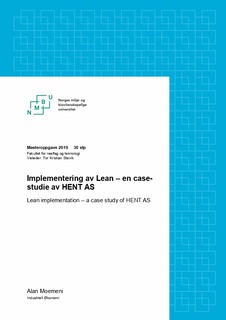Implementering av Lean : en case-studie av HENT AS
Master thesis
Permanent lenke
http://hdl.handle.net/11250/2625628Utgivelsesdato
2019Metadata
Vis full innførselSamlinger
- Master's theses (RealTek) [1722]
Sammendrag
Norsk byggenæring har de siste årene stått ovenfor en produktivitetsproblematikk til tross for at næringen omsetter for stadig mer. I et forsøk i å gripe tak i denne utfordringen har forskere vendt seg mot andre industrier som inspirasjonskilde. Som et resultat har en bygg-tilnærming av Lean-filosofien blitt til. Med en godt dokumentert effekt på produktivitet, har filosofien florert i det internasjonale byggemiljøet. Til tross for å kunne løse mange av produktivitetsproblemene den norske byggebransjen står ovenfor, kan det ikke observeres en allmenn adaptasjon av filosofien i norske entreprenørbedrifter. Dette kan være knyttet til utfordringen av å implementere et nytt tankesett i organisasjoner.
Masteroppgaven søker etter å forenkle prosessen ved å besvare problemstillingen: «Hvilke faktorer påvirker implementeringsprosessen av Lean og hvordan manifesteres filosofien i en entreprenørbedrift?». Dette ble gjort gjennom en case-studie av HENT AS. For å få et godt innblikk i innførings-forløpet har det blitt utført dybdeintervju med medlemmer av organisasjonen sterkt tilknyttet innføringen av filosofien. Empirien innsamlet gjennom intervju, dokumentstudie og uformelle samtaler har blitt satt opp mot teori og litteratur innen Lean, kultur og organisasjons-psykologi.
Studien avdekker en rekke faktorer litteraturen viser sterk konsensus for, som vil påvirke implementeringsprosessen. Forløpet for innføringen av Lean i HENT har blitt kartlagt, og deretter har prosessen blitt evaluert opp mot faktorene identifisert. Oppgaven identifiserer samtidig eksempler på bruk av Lean-verdiene som maler et bilde av HENTs tilnærming av filosofien. Denne tilnærmingen blir så satt opp mot litteratur innen organisasjonsendring og kulturbygning. Oppgaven finner at implementeringsprosessen HENT har utført tilrettelegger for et innovativt miljø som fremmer nyskapende tiltak. Dette for å øke produktivitet ved å eliminere ikke-verdiskapende aktiviteter. The Norwegian construction industry has in recent years faced a productivity problem despite the fact that the industry’s turnover is growing. In an effort to address this challenge, researchers have turned to other industries as a source of inspiration. As a result, a construction approach to the well-known Lean philosophy has been created. With a well-documented effect on productivity, the philosophy has flourished in the international construction environment. Despite presenting solutions to many of the productivity problems the Norwegian construction faces, there has been no widely adaptation of the philosophy in the country’s construction companies. This phenomenon has been linked to the challenges of implementing a new mindset into organizations.
The Master’s thesis seeks to simplify the process by answering the question: “What factors influence the implementation process of Lean and how is the philosophy manifested in a construction company?”. This was done through a case study by HENT AS. In order to gain a good insight into the implementation process, in-depth interviews have been carried out with members of the organization strongly associated with the process of introducing Lean. The empirical findings found trough interview has been set up against theory and literature in Lean, culture and organizational psychological literature.
The study reveals a number of factors for which the literature shows strong consensus, which will affect the implementation process. The course of introduction of Lean in HENT has been mapped, and then the process has been evaluated against the factors identified. The thesis also identifies examples of usage of Lean values that paint a picture of HENT’s approach to the philosophy. This approach is then set up against the literature in organizational change and cultural building. The study reveals that the implementation process HENT has carried out facilitates an innovative environment that promotes innovative measures, that increase the productivity by eliminating non-value adding activities.

